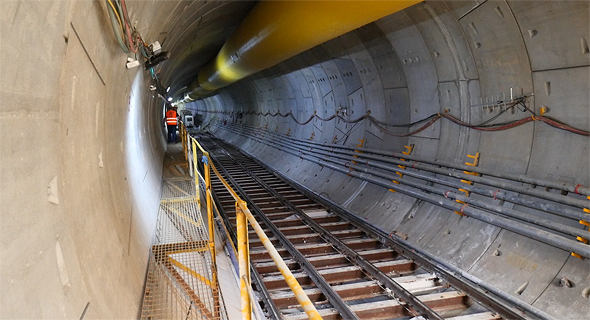Proximity to Mediterranean Sea May Hamper Work on Tel Aviv Underground
Dubbed the Red Line, the first light rail line, scheduled for completion by October 2021, will connect Tel Aviv with neighboring cities in its metropolitan area through a network of above-ground and underground stations
18:0228.05.18
The construction of Tel Aviv’s underground may be affected the city’s proximity to the Mediterranean Sea and the need to prevent damage to existing buildings, said Yuan Li, president of China Civil Engineering Construction Corporation Ltd. (CCECC), a company contracted to dig the tunnels for the project.
 A light rail tunnel under construction in Tel Aviv. Photo: Dor Manuel
A research published in 2017 on Wear, a scientific journal dedicated to the wear of materials, found that the presence of seawater may affect the rate of wear in TBM disc cutters.
A light rail tunnel under construction in Tel Aviv. Photo: Dor Manuel
A research published in 2017 on Wear, a scientific journal dedicated to the wear of materials, found that the presence of seawater may affect the rate of wear in TBM disc cutters.
For daily updates, subscribe to our newsletter by clicking here.
Dubbed the Red Line, the first light rail line will connect Tel Aviv with neighboring cities in its metropolitan area through a network of above-ground and underground stations. In a March report, Israel’s state comptroller, a government watchdog, warned about setbacks in six out of nine stations currently under construction, which may delay the completion of the entire project, currently scheduled for October 2021, by one year.
 A light rail tunnel under construction in Tel Aviv. Photo: Dor Manuel
A light rail tunnel under construction in Tel Aviv. Photo: Dor Manuel Speaking at an event held in Beijing by the Israel Chamber of Commerce in China (IsCham) this weekend, Mr. Yuan Li said he believes the project should be completed on time. However, he explained that since this is the first project where his company is using tunnel boring machines (TBMs) in proximity to the sea, it may prove difficult.
CCECC is a Chinese state-owned company which has been active in Israel since 1994.
Eight TBMs are currently in use for digging the Red Line’s tunnels. TBMs have a built-in pump system for the disposal of water from the ground it is digging through, but, in extreme cases, additional pumps have to be used, which might cause some delay.
Related stories:
- Tel Aviv-Based Railway Cybersecurity Startup Cylus Raises $4.7 Million in Seed Round
- 17 Years Later, Tel Aviv and Jerusalem to Be Connected by High-Speed Rail
- Train Safety Company Rail Vision Considers Nasdaq IPO
The work is currently being done in open territories but will soon progress to areas that are in the proximity of existing buildings which will force CCECC to work carefully to avoid damage, Mr. Yuan Li added.



